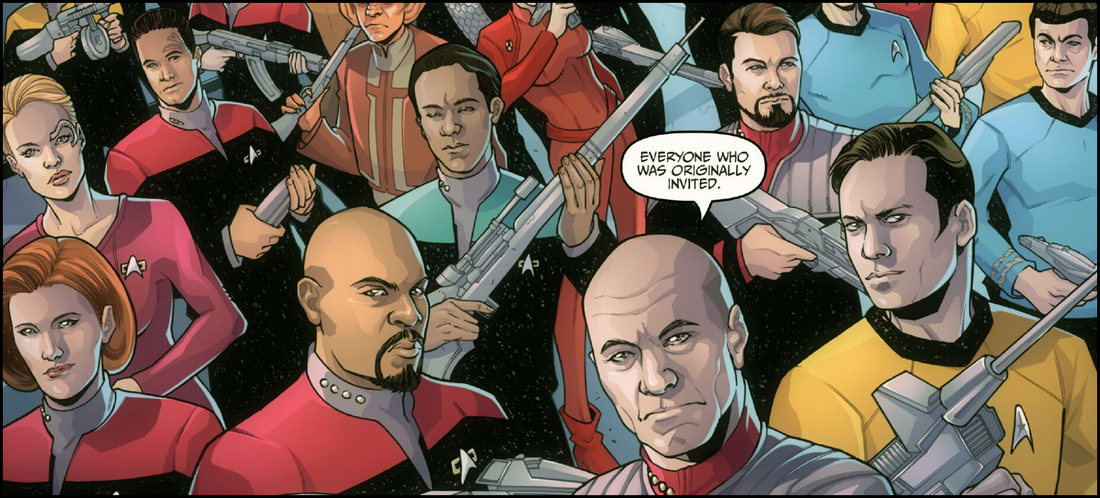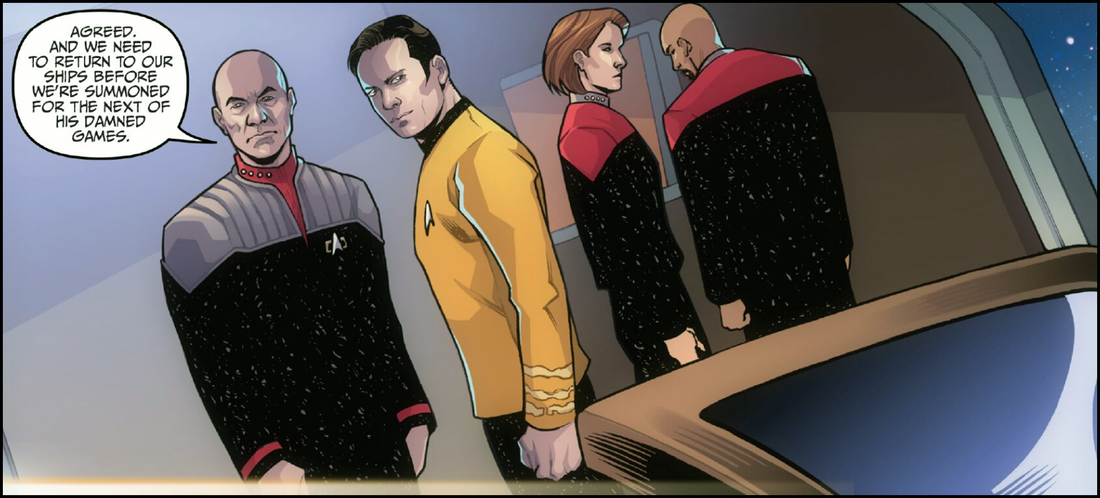No, I was a bit young when it aired in its original run on television, as I would’ve only been 2,3, and 4 at the time; but I retain a very distinct memory of seeing it some time in 1969 or 1970, so it could’ve been a first-run episode. And I do recall reading several of the photonovels (ask your parents, kids) as well as a few of the prose ones during their original run … so there.
The point I’m making here is that unlike many who pontificate about Trek I have been around. As they say, whatever Trek we’re on, “this isn’t my first rodeo.” And, yes, I’ll freely admit any time I’m asked about which incarnation is my favorite that it just doesn’t get any better than Kirk, Spock, and McCoy. I’ve no doubt that some of this is owed to nostalgia – we’re all human, so we’re all equally wired that way – but I also possess a fondness for storytelling of a different bygone era … and so very much of the original series just tickles my fancy.
I believe it was DC Comics in the 1980’s that had a pretty successful run with the Star Trek brand. To their benefit, they scored a handful of writers and artists who actually penned and drew some fabulous tales that, thematically, went hand-in-hand with the tone of The Wrath Of Khan, The Search For Spock, and The Voyage Home. At some point, the license transitioned to Marvel Comics, and I followed along for much of that ride, as well. I recall being not as impressed with the stories for the most part, but the creative team did put out some very good stuff involving Deep Space Nine, one of the franchise’s most overlooked incarnations.
So, again, I am speaking from this foundation with respect to my thoughts of IDW Publishing.
They’re a bit of an odd duck, IDW. For a number of years I was involved in reviews at Amazon.com (until that megacompany dumped thousands of us from their roster after changing the rules on us), and I was provided content from several graphic publishers. Dark Horse was certainly the most fan-friendly, but no matter how often I tried establishing myself with IDW they just never replied. I believe at one point I did receive an email implying they would be offering me content, but their instructions on how to obtain it were a bit bizarre, so I gave up on them.
Still, because I’m a huge Trek fan, I’m inclined to pick up the occasional graphic novels these days. (The prices of independent issues made me give up on regular comic book reading long ago.) IDW does some respectable work – The Q Conflict is good, though a bit lukewarm, which I’ll get to in a moment: of what I’ve read, I think the tales they’ve told with the JJ Abrams’ version of Trek have been better than any other crew. JJ’s universe is far more ‘pop culture’ leaning than the others, so perhaps it’s not all that difficult to identify the tone and run with it in new adventures. Hats off to them on a job well done.
The Q Conflict came highly recommended to me by an internet friend. I read the premise – Q and a small group of the franchise’s omnipotent fellows choose to run a war by proxy, enlisting the crews of the original show, The Next Generation, Deep Space Nine, and Voyager to serve as their pawns for the throwdown. Though I’ve never been much of a fan of these all-powerful beings, I decided – after doing a bit of reading of how well the miniseries was received – to give it a go.
Meh.
My issue with Q and like-minded folks is that the stories essentially involve no real risk much less consequence. After all, when reality can be reshaped at the snap of fingers, where is there any legitimate danger to anyone involved? Episodes of The Next Generation – namely ‘Tapestry’ and ‘All Good Things’ – circumvented that narrative shortcoming (to a degree) by leaving these lowly humans to be the true masters of their fate. Not all of the Q episodes did this, true, but these two uniquely derailed any attempts by those ‘gods’ to step up and alter the outcomes.
By comparison, The Q Conflict falls short.
In fact, Q sets all of these events in motion, giving these various crews an opportunity to ‘play a game’ wherein there are decidedly no consequences whatsoever to the players. In fact, I believe it was Captain Picard who insists on that very rule, that there be no deaths, etc., and this framework – whether you like it or not – simply removes any possibility of tension from the entire arc. While some might argue that, “Well, this is a comic book, and no writer is going to kill off any of the main characters anyway” … and my reply would be, “Then why tell this story anyway? These gods are merely monkeying around in their own affairs and using humans as a form of entertainment … so why go along with it?”
I know, I know, I know. I do tend to overthink things, especially when it comes to stories. I do this because I’m a story nut. I prefer a good story over great characters, and I do this because even marginal characters can do good work in a good story: bad characters can’t – or typically, they can’t – and they accomplish nothing. But give any character a good story and you cross that first hurdle of having something that is relatable. The Q Conflict, as told, just wasn’t relatable. At least, not to me.
Now, this isn’t to say that I disliked the tale, because that would be far from the truth. Scribe Scott Tipton certainly has a good grasp of these characters, so much so that he manages to breath a bit of life into even the smallest of scenes throughout this arc. Even some unusual choices of guest stars are plucked from The Next Generation’s run and given a bit of screen time in this tale, and their scenes and dialogue feel authentic to what audiences came to know of them on television. That, alone, is probably why an awful lot of readers rated this Conflict as highly as they did: with this expansive number of Starfleet’s finest on display, there’s something to be said for ‘getting it right.’
That aside, it all ends probably the way any longtime Trekker, Trekkie, or general Trek enthusiast might suspect: with a snap of Q’s fingers, everything is pretty much back to normal … and that only underscores the objection I raised above about little to no risk. A few players do receive a bit of an evolution – Wesley Crusher apparently undergoes a bit of a makeover, but I’ll refrain there from any other spoilers – but the end result is much the same: nothing ventured, nothing gained.
While The Q Conflict is worth the time and investment (I picked this one up entirely on my own dime), it isn’t one I’ll be revisiting any time soon.
As always, thanks for reading … and live long and prosper!
-- EZ



 RSS Feed
RSS Feed